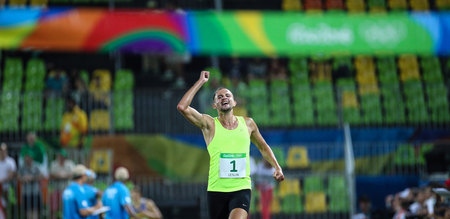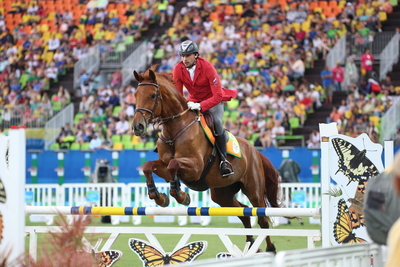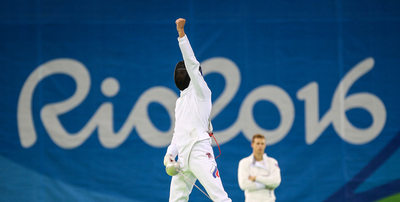Alexander Lesun on records, responsibility and living the dream of Modern Pentathlon Olympic glory
Returning home from the Olympic Games can feel like waking up from an intense dream, where the first thought is: "Did that really happen?"
For Alexander Lesun, it really did happen, and it was no dream. If anything, the dream is what he is living now, as he basks in the adulation and glory of an Olympic champion and national hero.
 Lesun’s career high in Rio was a hard-earned reward for years of dedication and accomplishment. He travelled to Brazil as a two-time world champion and six-time world medallist, with multiple team medals, numerous World Cup podium finishes and a 4th place at the 2012 Olympic Games in London. Each of these successes formed part of his journey to the ultimate prize: Olympic gold and a new Olympic record for both Fencing and overall score.
Lesun’s career high in Rio was a hard-earned reward for years of dedication and accomplishment. He travelled to Brazil as a two-time world champion and six-time world medallist, with multiple team medals, numerous World Cup podium finishes and a 4th place at the 2012 Olympic Games in London. Each of these successes formed part of his journey to the ultimate prize: Olympic gold and a new Olympic record for both Fencing and overall score.
And now Alex Lesun is reaping the rewards: a new car, an invitation to appear on all the top TV shows, and a feeling of certainty that he has inspired countless youngsters to believe that anything is possible in sport and in life.
Lesun is acutely conscious of his responsibilities as a role model, and this plays a big part in how he reflects on the first few weeks of his reign as Olympic champion.
“Almost all the days after the Olympic Games were dedicated to the celebration of the Olympic victory,” he tells us.
“At the reception with the Russian Federation President Vladimir Putin and Prime Minister Dmitry Medvedev all the Olympic champions and medallists received State Government awards and received gifts of white BMW vehicles with our names on the licence plates.
“It was a pleasant surprise. But the celebrations had started even before. At the airport when we arrived home from Rio, young Moscow pentathletes with their coaches welcomed me with big banners with my photo and greetings.
“One day I visited Artek, an international children’s centre on the Black Sea, to meet the next generation of athletes within the framework of the Russian Olympic Committee’s educational campaign Olympic Patrol. I visited a lot of schools and sport clubs to meet with youngsters and motivate them to commit to sport.
 “My coaches and I were also honoured by the Mayor of Moscow, Sergei Sobyanin, with award certificates from Moscow Government. There will be a similar reception event at my club, Dynamo. My schedule is very busy and tight now but I always find time to celebrate my Olympic victory with my family and close friends.”
“My coaches and I were also honoured by the Mayor of Moscow, Sergei Sobyanin, with award certificates from Moscow Government. There will be a similar reception event at my club, Dynamo. My schedule is very busy and tight now but I always find time to celebrate my Olympic victory with my family and close friends.”
The main change to Lesun’s life since he claimed that coveted gold medal relates to his profile. In most countries Olympic champions become automatic A-listers in the months after their victory, and Russia is no different.
“I do not feel any miraculous changes, of course there is a lot of media attention,” he reflects. “I have already been involved in numerous TV projects. People call me every day and invite me for interviews and to appear on TV programmes. I try my best not to say no.
“Recently I was a guest on the famous Russian stand-up show Comedy Club, and the very popular late-night talk show Evening Urgant [Urgant is the name of the presenter]. This I did not expect.
“To be honest, I have not had any real rest yet. There is a lot of demand for me. I sleep little. So far, I only dream about taking a holiday. When I am very tired I need rest from everything. But I am always in good company playing volleyball, snowboarding or wakeboarding.
“I hope that my Olympic medal will help me to keep both feet on the floor in future. At least it will bring me some stability and advantages in career after my retirement from professional sport.”
At the age of 28 Lesun has completed a “holy trinity” of athletes from the Russian Federation who have won the ultimate prize in Modern Pentathlon (after Dmitri Svatkovskiy in 2000 and Andrey Moiseyev in 2004 and 2008). So what is next? Is he satisfied to have reached the pinnacle of the sport, or does success make him hungry for more? The bad news for his rivals is that Lesun is already making plans for the defence of his title in Tokyo in 2020…
“I am very happy indeed to have won the Olympics. What is next? I have no plans to say goodbye to the pentathlon,” he confirms. “I feel like competing for another four years at the same high level as I was competing for the last seven years. This is my new number one goal - to continue.
“I'm looking forward to the 2020 Games. I think it will be the most technologically strong Olympics and it will be very interesting to see how Japan, with its eastern and measured way of life and a high level of technological development, will prepare and organize the Olympic Games.
“The Pentathlon Stadium will be introduced for the first time there, and we all hope that the Mixed Relay will be included in the Olympic programme. All this motivates me to already start thinking about the #RoadToTokyo.”
 So how did Lesun achieve the crowning glory of his career to date? He puts it all down to smooth preparation – he won individual silver and relay gold at the 2016 World Championships in Moscow (RUS) earlier in the summer – and hitting the ground running in the event itself. In the Youth Arena on day one, Lesun staked a strong claim for Olympic gold with his record-breaking 28 Fencing victories, five more than his nearest rivals managed.
So how did Lesun achieve the crowning glory of his career to date? He puts it all down to smooth preparation – he won individual silver and relay gold at the 2016 World Championships in Moscow (RUS) earlier in the summer – and hitting the ground running in the event itself. In the Youth Arena on day one, Lesun staked a strong claim for Olympic gold with his record-breaking 28 Fencing victories, five more than his nearest rivals managed.
“The key to my gold was fencing,” he acknowledges. “What could be better than to have two records – in fencing and overall result – during only one Olympics? I also did well in Riding with a horse that was not easy. In each discipline I achieved at least a small victory.
“The final preparations for Olympics were smooth, according to my training schedule and under the control of a professional support team. Perhaps, if I had won the individual World Championship, the winner's title and heavy responsibility would have accompanied my training process prior to Rio.”
In all Olympic sports, the key difference between Olympic gold and World Championship gold is the number of people across the world who hear about it. The Olympics offers a unique profiling opportunity for athletes and success is amplified by mainstream media across entire societies.
In short, Lesun was already a great pentathlete but now he is a household name in Russia and an iconic figure in his sport. He has led by example on the field of play, and now for the benefit of the sport he needs to be a role model in life. Lesun is very aware of this.
“This is a very great challenge and responsibility for me, and it’s important to remember this liability in my every word and action,” he says. “In fact, thousands look at me and consider me an example for children to follow. I should always keep this in mind.”
So what would the Olympic champion say to a young aspiring pentathlete who wants to follow his example?
“For every beginner in sport I have four words: patience, diligence, strength of mind and dignity. When an athlete is sure that he has mastered these core components of success, then everything – good luck, a victory and more – will come.”



